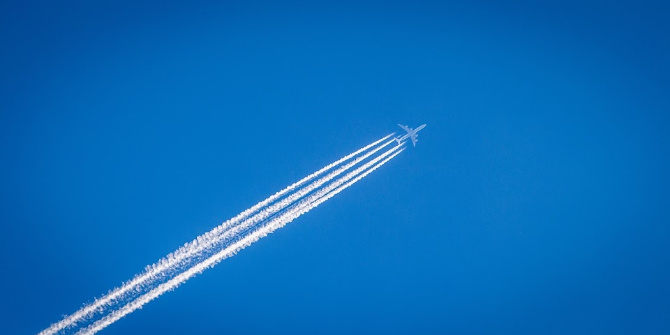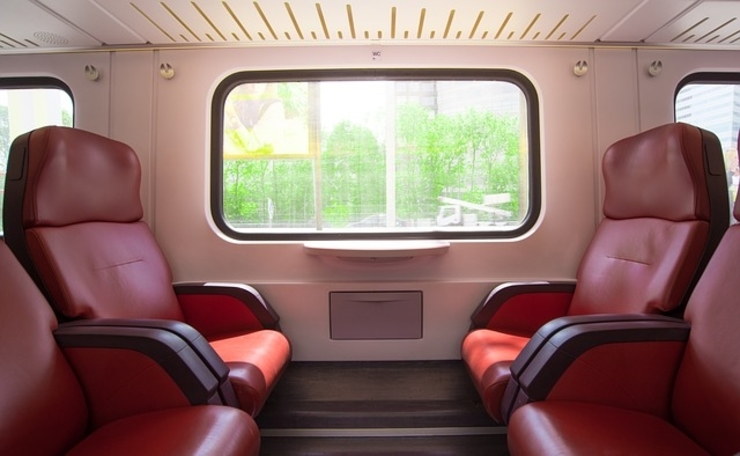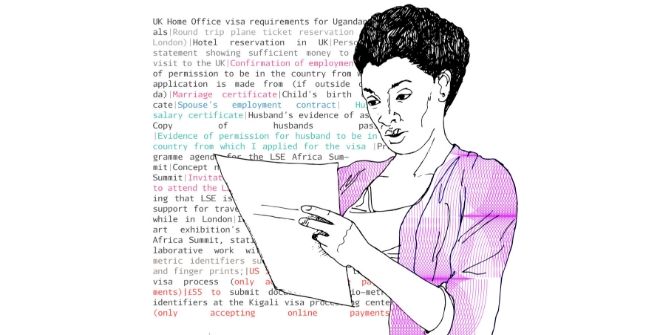Academic flying is often justified on the basis that international conferences and travel are important to the production of new knowledge. As such, travel brings researchers into contact with new ideas, allows them to share and refine their own ideas and therefore improves the quality of their research. However, in this post Seth Wynes argues that beyond a certain level there is no clear relationship between the amount of travel undertaken by academics and the quality of their research in terms of productivity and the production of high quality papers: And, that as universities face increasing demands to reduce greenhouse emissions, they should look to ways to manage academic travel more efficiently and equitably.
Flying comes at a huge environmental cost, and yet many researchers view it as crucial to their success. Using the University of British Columbia as a case study, we investigated whether the faculty at our institution who flew the most were also the most successful. We found that beyond a small threshold there was no relationship between scholarly output and how much an individual academic flies.
These results are not intuitive. Networking, attending conferences and delivering lectures should give your ideas an edge, help you to disseminate your research, and result in higher quality papers that get more citations. And the fastest way to do all of these things in person is to fly. But even when accounting for department, position and gender, we found no relationship between how much academics travel and their total citation count or their hIa (a version of h-index adjusted for academic age).
There could be many reasons for this. Perhaps it’s possible to be successful even in a geographic island like Vancouver (which is more isolated than most European cities or even cities on the East coast). After all, there’s still plenty of networking and research to be done close to home or by videoconferencing. In addition to this, some researchers may fly so much that the benefit they gain by networking is negated by the lost opportunity to start a new project, or finally submit that long neglected research paper.
We certainly did find evidence that researchers fly more than is likely necessary. In the portion of our sample composed of only fulltime faculty, we categorized 10% of trips as “easily avoidable”. These were trips like going to your destination and flying back in the same day or flying a short distance trip that could have been replaced by ground travel. Interestingly, green academics (those studying subjects like climate change or sustainability) not only had the same level of emissions from air travel as their peers, but they were indistinguishable in the category of “easily avoidable” trips as well.
But success isn’t just measured by scholarly output, and so we also checked for relationships between how much academics flew and their annual salaries (which are publicly available). We did find a significant relationship: people who fly more, get paid more. Causation though, could lie in the other direction. Prestigious scholars with more grant money may have extra funds with which to book air travel, for instance.
However, the days when grant money is the only limitation on the number of flights you can book may be drawing to an end. Aviation’s global share of emissions is expected to increase rapidly, and there are no easy techno-fixes to prevent this growth from ruining our chances to meet climate targets. Addressing air travel may actually require people to fly less, especially high-flying academics who sometimes emit more greenhouse gases per year from flying than their neighbours do through commuting, eating and powering their homes.
Caption: Air travel emissions for 997 individual travelers over 18 months at the University of British Columbia. 121 individuals (dark blue) were responsible for 50% of emissions from the sample.
So what to do with this information? I’ve spoken with many early career researchers who are concerned that they need to fly frequently not only to network, but also to attend job interviews across the continent. If institutions begin curtailing air travel they probably ought to consider issues of equity, including those brought about by seniority. Our research, for instance, found that graduate students and postdocs produced about three times less emissions from air travel than fully tenured professors on average. Female academics also traveled less in our sample than their male colleagues, which is a consistent finding in the literature.
Assuming that institutions and individuals want to reduce emissions in an equitable manner, what steps can they take? And what will the future of travel and networking in academia look like in a carbon constrained world? Here are a few ideas:
- more videoconferencing, especially for events that rely less on face to face interactions (like invited talks)
- changes in promotion requirements so that academics don’t have to decide between delivering an international talk and getting a raise
- more events, meetings and research packed into fewer, longer trips
- more ground based travel (and hopefully more freedom from institutions to take the extra time needed in order to avoid air travel)
- disincentives on frequent flying, such as an internal flight fee that contributes to carbon offsetting projects
At many universities there is a groundswell of support for addressing emissions from academic air travel. Some research centres are prioritizing ground travel, while faculty at others have agreed to set personal emissions reductions targets. Many initiatives are still in early stages, but we can expect them to gain traction as the sense of urgency driven by a changing climate intensifies.
For those who feel unwanted pressure to fly but would rather spend time close to their family, or for those trying to lead by example with a low-carbon lifestyle, these initiatives may come as a welcome relief. Our research suggests that flying less doesn’t have to compromise the impact of one’s research. In the world of air travel and climate change, this is a rare bright spot worth noting.
This post draws on the author’s co-authored article, Academic air travel has a limited influence on professional success, published in the Journal of Cleaner Production
Note: This article gives the views of the author, and not the position of the LSE Impact Blog, nor of the London School of Economics. Please review our comments policy if you have any concerns on posting a comment below
Image Credit, VanveenJF via Unsplash.










I wonder about restricting this analysis to ‘academics’, by which I assume the author means university staff whose main activity is a combination of teaching and research. In my personal observation the biggest university travellers are deans, and staff who report directly to the vice chancellor/president, who travel mostly to develop international links and students.
You have omitted the most important reasons those in the humanities fly: to study unpublished documents, manuscripts, and monuments, and to delve into archives! Only a fraction of the world’s archives is online. If historians relied solely on published documents, they would merely reshuffle the same deck of cards. Original archival research pushes knowledge forward.
In my experience, many conferences and workshops actually disallow participation via videoconferencing or other tech (when requested), let alone make it possible.
Things like telepresence robots which allow a participant to mingle and choose speak to whom they meet by chance (one of the cases for in-person meetings), are unavailable for rent at even large universities or conference venues at any price.
In my inquiries, virtually no academics have ever seen or tried driving a telepresence robot out of curiosity – even ones who are in a robotics research group. Therefore they cannot know whether or not it would satisfy their official purpose (as opposed to the unofficial purpose of getting a free holiday paid for by grant money).
We need to add two further recommendations to the above list:
* All conferences and organized meetings must state how they provide a capability for virtual attendance on the same page that they explain how to get there from the nearest airport and their statutory disabled access conditions.
* Grant money in budgets that is now reserved for travel expenses must be allowed to be spent on tele conferencing and telepresence robots (rent or buy).
In frustration with Liverpool University ever getting with the idea, I’ve bought my own robot with my own money that I can do with as I like, such as lending it to any academics who are interested in giving it a try. Contact me on Twitter at:
https://mobile.twitter.com/wheeliepad
Another fly by night academic article 🙂
Tongue in cheek sorry – but really how small a
fraction of all air travellers would this be? And they often combine a holiday, which most of us should take more often? I think you’re looking in the wrong place for solutions to climate change or “productivity”?
In Europe, academics routinely fly comparatively short distances, such as London-Amsterdam, which is completely avoidable due to excellent train links. Plus, Europe-wide conferences are sometimes held on the edge of the continent (Finland, Portugal, Scotland), which needlessly increases travel distances for most attendees.
A general observation from Europe: The more educated and policy savvy people are, the more they support government efforts to combat climate change, and the more irresponsibly they themselves behave when it comes to travel. We have a strong policy elite consensus that everyone except the policy elite needs to embrace behavioural change to avert a climate disaster.
Professional associations (and others) are increasingly taking advantage of virtual event platforms, including two that concentrate on scientific conference management, Morressier.com and Underline Science (underline.io). Other platforms create communities around subject matter through academic seminar presentations, such as mora.stream and Cassyni.com.